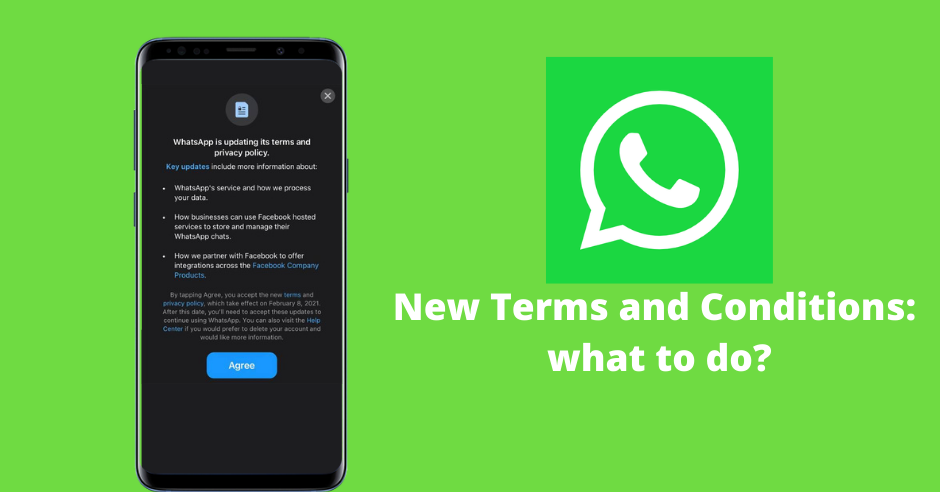WhatsApp terms and conditions: what to do?

You must agree to the WhatsApp terms and conditions if you want to use the chat app on your smartphone. The legal notice is rarely read, most of the time the user simply presses “Agree”. Now there is a forced update of the terms of use, which is accompanied by serious changes.
Table of Content
WhatsApp terms and conditions: Chat app collects a lot of data
Hardly anyone takes the trouble to read the small print terms and conditions or terms of use. It is really worth taking a closer look.
- If you agree to the terms and conditions, allow WhatsApp to use your telephone number, profile name, profile picture, and your e-mail address. In addition to your own data, those of your contacts are also used, i.e. their telephone number.
- WhatsApp also accesses information that has little to do with the actual use of the chat app. Usage and log information is saved and which functions you use within the app, such as telephony.
- WhatsApp is also interested in your smartphone model and which network you are using. The time zone and language that you have set on your smartphone also seem to be important for WhatsApp – as well as your location information.
- By agreeing to the terms and conditions, you forego a lot of privacy. By the way, you also do without data protection. The data and information collected do not stay with WhatsApp. The app forwards this to other companies for analysis.
- WhatsApp has legally secured itself in this regard with the following passage in the terms and conditions: “WhatsApp uses the information available to it and also works with partners, service providers, and affiliated companies”.
- However, since the GDPR came into force, you can object to data being passed on to Facebook in WhatsApp. We’ll show you how to do this in another practical tip.
- You can also view stored data. You will also find instructions for this with us.
Deadline postponed: Mandatory update of the terms of use by May 15, 2021
First, WhatsApp users were asked to agree to the new terms of use and the revised privacy policy by February 8, 2021. Because many angry users apparently migrated to the competition, the messenger service postponed the introduction of new data protection rules to May 15, 2021. Wrong information about the forced update had been distributed, which they still wanted to clear.
- In 2014, WhatsApp was taken over by Facebook. The data protection guideline has allowed WhatsApp user data to be passed on to Facebook since 2016 – on the one hand for advertising purposes and on the other to improve products. However, this passage did not apply to the EU, but only to all countries outside the EU.
- The new terms of use and the revised data protection guideline interlink Facebook companies and WhatsApp even more. According to the company, the update is primarily about how WhatsApp processes user data and how companies can save and manage chats.
- Basically, WhatsApp messages are only stored on the device, not on Facebook servers – unless a message could not be delivered. The message is then stored in encrypted form on the servers for 30 days, as is the forwarded media.
- WhatsApp is particularly interested in user data. How, when and for how long you use Whatsapp is collected as well as information about your smartphone model, battery level, signal strength, and IP address. If you have allowed WhatsApp to access your location, WhatsApp can also access the location for diagnostic purposes via IP address and call prefixes.
- The problem with this update: You have to agree to the changes if you want to continue using WhatsApp. If you decline, all that remains is to delete the messenger – or to switch to alternatives, which we present in a paragraph below in the article.
- However, Niamh Sweeney, WhatsApp’s Director of Policy, commented on the discussions about the forced update on Twitter on January 7th, 2021. Sweeney writes in her tweet that the update will not change anything for users from the EU. No changes have been made to WhatsApp data sharing practices in Europe. Data from WhatsApp users in the EU would still not be shared with Facebook for a product or ad improvement.
- WhatsApp makes it clear: many users could soon be banned – these steps of exclusion are planned.
Terms and conditions: You assign these rights to WhatsApp
The question of the rights to images, texts, and videos arises again and again.
- What you send in WhatsApp should actually be private. It is your pictures, texts, videos, or voice messages.
Here, too, it is worth taking a closer look at the terms and conditions of the app. - You read here: “In order for us to operate and provide our services, you grant WhatsApp a worldwide, non-exclusive, royalty-free, sublicensable and transferable license to use, reproduce, distribute, create derivative works from, display and perform the information (including the content ) that you upload, transmit, save, send or receive on or via our services “.
- This clause is not really clear. The passage “So that we can operate and provide our services” can be interpreted in different ways.
- In principle, you transfer the rights of everything you send via the app to WhatsApp. By agreeing to the “sublicensable and transferable license to use, reproduce, distribute, create derivative works, display and perform the information” you also allow WhatsApp to do what the company wants with your content.
- The license to the content can be passed on to other companies or otherwise published. Your private content could appear anywhere, for example on Facebook. Privacy looks different.
- How the clause can ultimately be interpreted must certainly be clarified on a case-by-case basis.
WhatsApp Chat: Free admission from 16
Many children and young people use WhatsApp. Actually, this is not allowed according to the terms and conditions.
- According to the terms and conditions, you must be at least 16 years old as a user if you live in the European Union. Outside the EU, the age limit is 13 years.
- If you are younger, you may only use WhatsApp with the permission of a legal guardian.
- However, WhatsApp does not control the age required when setting up the chat app, nor the consent of a legal guardian, if necessary.
- In principle, the age restriction is simply based on the provider’s trust that you will answer truthfully and act.
These alternatives to WhatsApp exist
WhatsApp is a popular messenger, but by no means the only free messaging service. We will introduce you to a few alternatives.
- Telegram: Telegram is a free, cloud-based messenger app that you can use not only to chat but also to make phone calls.
- Signal: Signal can do almost everything that WhatsApp can do. Chats and telephony are secure with end-to-end encryption; Signal is available for both Android and iOS.
- Kik: Unlike WhatsApp and Co, this Kik does not run via your telephone number, but via your email address. This limits the ease of use somewhat because you have to know the Kik username if you want to write to someone.
- Threema: Threema uses secure end-to-end encryption and contacts can be divided into different levels of trust. The messenger supports text and voice messages, calls, and the sharing of pictures, videos, and locations. However, Threema is not free.
WhatsApp’s collection of data has been a problem since the GDPR came into force. In our next practical tip, we will explain what you need to know when using WhatsApp on your company cell phone.
Also Read: 5 Free Alternatives to WhatsApp – [Best For Privacy & Safety]









